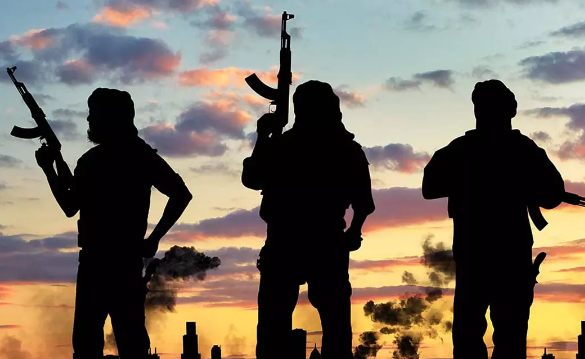Foreign
University Strips American Rapper ‘Diddy’ Of Honorary Degree Over Assault Video Of Girlfriend

The Howard University board, a historically-black university in Washington DC, on Friday moved to strip Sean “Diddy” Combs of his honourary degree after the video of him physically assaulting his former girlfriend, Cassie Ventura surfaced online.
American rapper, Sean “Diddy” Combs, had apologised for physically assaulting his former girlfriend, Cassie Ventura, in 2016.
A surveillance video captured in 2016 which was obtained exclusively by CNN surfaced on the internet showing the moment the rapper physically assaulted his former girlfriend during an altercation that matches allegations in a now-settled federal lawsuit filed by Ventura in November.
The footage, taken from multiple camera angles dated March 5, 2016, showed an incident that, according to Ventura’s complaint, occurred at the now-closed InterContinental Hotel in Century City, Los Angeles.
CNN verified the location based on publicly available photos of the former hotel’s interior.
In the video, Ventura exits a hotel room and walks to a bank of elevators. Combs, holding a towel around his waist, runs down a hall after Ventura. He grabs her by the back of the neck and throws her to the floor. Still holding his towel closed with one hand, he then turns to kick her, the video shows.
As Ventura is on the ground, Combs retrieves a purse and suitcase from the floor near the elevators. He turns around and kicks Ventura again as she lies motionless on the floor. About four seconds transpire between the two kicks, according to the video. He then briefly drags Ventura by her sweatshirt toward a room before walking away.
Ventura is then seen slowly standing up. She gathers items from the floor and moves to pick up a phone on the hallway wall near the elevators. Combs, still in a towel and socks, returns.
A mirror directly across from the security camera shows Combs appearing to shove Ventura.
Seconds later, he sits down on a chair, grabs an object off a table and forcefully throws it toward Ventura.
Combs is seen walking away, then turns toward Ventura once again when an elevator door opens and someone appears to exit.
Combs in an apology video he posted on his Instagram page said he takes full responsibility for his actions in the video, noting that he had to go for therapy and rehabilitation after the incident.
Combs said, “It is very difficult to reflect on the darkest time in your life, but sometimes you have to do that. I was f***ed up. I make no excuses.
“My behaviour on the video was inexcusable. I take full responsibility for my actions in the video. I’m disgusted. I was disgusted then when I did it, I’m disgusted now.”
However, in a statement on Friday, the university said his “behaviour as captured in a recently released video is so fundamentally incompatible with Howard University’s core values and beliefs that he is deemed no longer worthy to hold the institution’s highest honor.”
The university’s statement said Mr Combs’ name would be removed from all documents listing honourary degree recipients.
“The University is unwavering in its opposition to all acts of interpersonal violence,” the statement said.
Howard University conferred the degree on Mr Combs in 2014. It said in its statement that it would also end a scholarship in his name and terminate a 2016 “gift agreement” with the rapper.
That agreement was a $1m (£785,000) donation that he made through his foundation.
The Sean Combs Foundation did not respond to a request for comment.
Foreign
Ukraine Accuses Russia Of Launching 2800 Aerial Bombs, Over 1400 Drones In 14 Days

Ukrainian President, Volodymyr Zelensky, has accused Russia of ongoing hostilities, stating that since the beginning of April, Russia has launched nearly 2,800 aerial bombs, over 1,400 Shahed drones, and approximately 60 missiles at Ukraine.
Zelensky’s statement, released on Monday, reads, “Currently, 38 people are receiving treatment inmedical facilities in Sumy following yesterday’s Russian ballistic strike — among them, 9 children. Eleven people, including 3 children, are in critical condition.”
“Every effort is being made to provide them with maximum assistance. Yesterday’s strike alone claimed 34 lives and left 119 people injured. Tragically, 2 children were killed, and another 15 were wounded.”
“Another 7 people were injured overnight in Odesa during a ‘Shahed’ drone attack. Last night, the Russians also struck Slovyansk, Uman, Kharkiv, Beryslav, and other cities and villages.”
“All the damaged sites are civilian: apartment buildings, stores, a car service station.”
“I thank all the services and everyone involved in rescuing people and defending lives. Russian terror continues every day and night. Since the beginning of April alone, the Russian army has used nearly 2800 aerial bombs, over 1400 attack drones — most of them ‘Shaheds’ — and nearly 60 missiles of various types, including ballistic ones.”
“Only real pressure on Russia can stop this. Tangible sanctions are needed against the sectors that finance Russia’s killing machine. The one who brought the war must be stopped and held accountable for what they have done; that is only fair,” Zelensky said.
In an earlier statement yesterday, Zelensky urged the world not to remain silent in the face of Russia’s continued aggression against Ukraine: “As of now, 31 people are known to have been killed in Sumy by the Russian ballistic missile strike. Among those killed were two children. My condolences to the families and loved ones… More than 84 people have been wounded, including 10 children. All of them are receiving the necessary assistance.”
“It is crucial that the world does not stay silent or indifferent. Russian strikes deserve nothing but condemnation. There must be pressure on Russia to end the war and guarantee security for people. Without truly strong pressure, without sufficient support for Ukraine, Russia will continue dragging this war out.”
Zelensky also accused Russia of rejecting a potential peace opportunity involving U.S. President Donald Trump.
“It’s now the second month that Putin has been ignoring the U.S. proposal for a full and unconditional ceasefire. Unfortunately, there in Moscow they are convinced they can keep killing with impunity. Action is needed to change this situation.”
World leaders have condemned the latest wave of Russian attacks and pledged solidarity with Ukraine.
On Saturday, top diplomats from Russia and Ukraine traded accusations over breaches of a tentative ceasefire agreement brokered by the United States. The deal aimed to halt attacks on critical energy infrastructure, signaling an attempt to ease tensions in the third year of the war.
However, Sunday’s strike underscored the fragility of such negotiations and the continued toll on Ukrainian civilians.
The war, which began with Russia’s full-scale invasion in February 2022, has resulted in tens of thousands of deaths and millions displaced, with no comprehensive peace agreement in sight.
International observers have raised concerns that the missile strike may constitute a violation of international humanitarian law.
Sumy, located near Ukraine’s northeastern border with Russia, has faced repeated assaults since the war began but had seen a relative lull in recent months. Sunday’s bombing marks one of the deadliest strikes in the region in over a year.
Ukrainian officials have called on allies to increase military aid and intensify sanctions on Russia, warning that continued attacks on civilian areas threaten any hope for a negotiated resolution to the war.
Foreign
US orders 30-day registration for all foreign nationals or face jail, deportation

By Francesca Hangeior
The United States Department of Homeland Security (DHS) has announced a new rule requiring all foreign nationals who stay in the country for more than 30 days to register with the federal government.
The directive, introduced this week, is one of the strictest immigration measures in recent years.
In a post titled “Message to Illegal Aliens” and tagged to President Donald Trump and Homeland Security Secretary Kristi Noem, the agency stated,
“Foreign nationals present in the U.S. longer than 30 days must register with the federal government. Failure to comply is a crime punishable by fines and imprisonment. @POTUS Trump and @Sec_Noem have a clear message to Illegal aliens: LEAVE NOW and self-deport.”
Foreign nationals present in the U.S. longer than 30 days must register with the federal government. Failure to comply is a crime punishable by fines and imprisonment. @POTUS Trump and @Sec_Noem have a clear message to Illegal aliens: LEAVE NOW and self-deport. pic.twitter.com/FrsAQtUA7H
Non-compliance could lead to daily fines of $998, heavier penalties for those who promise to leave but don’t, imprisonment, and permanent bans from re-entry.
DHS warned that delaying registration will increase penalties and reduce the chances of returning legally.
“The longer you wait, the higher the penalty, and the slimmer your chances of returning,” the department said.
The agency also introduced a “safe exit” provision for undocumented individuals who choose to leave voluntarily.
Those who self-deport may be allowed to select their departure flight, keep their earnings if they haven’t committed any crimes, apply for subsidized travel if they can’t afford it, and stay eligible for future immigration pathways.
While the rule doesn’t currently apply to individuals on valid visas like H-1B or F-1, DHS emphasized that once a visa becomes invalid—due to expiration, job loss, or program termination—the individual is considered “unlawfully present” and subject to the same penalties.
Maintaining legal status, the agency noted, is more critical than ever.
Foreign
Swiss woman abducted in Niger Republic

By Francesca Hangeior
A Swiss citizen has been kidnapped in Niger, Switzerland’s foreign ministry told AFP, confirming information published by a Nigerien media outlet.
The foreign ministry said it had been “informed of the kidnapping of a Swiss citizen in Niger.
“The Swiss diplomatic mission in Niamey is in contact with the local authorities. Clarifications are under way.”
The governor of the Nigerien state of Agadez, General Ibra Boulama Issa, said the abduction happened in Agadez city, where an Austrian woman was kidnapped three months ago.
The general said “a foreign woman… of Swiss nationality” had been taken from her home there late Sunday.
In a statement, he also referenced the January 11 kidnapping of the Austrian.
-

 News13 hours ago
News13 hours agoSHOCKING! One month after giving birth, woman discovers another baby in her womb
-

 News13 hours ago
News13 hours agoTears, anguish as Plateau Community buries 51 killed by bandits
-

 News11 hours ago
News11 hours agoCBEX: 60 fraudulent Ponzi scheme operators to avoid in Nigeria
-

 News13 hours ago
News13 hours agoAngry investors raid CBEX office, loot assets in Ibadan after digital Platform crash
-

 News19 hours ago
News19 hours agoPeter Obi speaks as Benue govt. blocks humanitarian visit
-

 News19 hours ago
News19 hours agoFUOYE VC suspended over sexual harassment allegations
-

 Politics13 hours ago
Politics13 hours agoIgbo Youths Set To Mobilize 5 Million Man-March In Support Of Tinubu, Kalu
-

 News13 hours ago
News13 hours ago‘Not something I’d wish on anyone’ — Melinda Gates opens up on divorce






